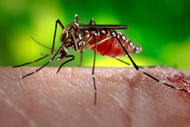West Nile virus:
West Nile virus (WNV) is a mosquito-borne pathogen belonging to the Flaviviridae family. WNV is transmitted primarily by infected mosquitoes, but other mechanisms of infection have been identified, including transmission through blood transfusion, organ transplantation, transplacental transfer, and through breast milk from an infected mother to her infant. Since its introduction into North America in 1999, WNV has spread across the continent, with the CDC reporting nearly 50,000 confirmed cases and over 2,000 deaths. Recent studies suggest that at least 30 undiagnosed cases of WNV occur for every case reported and the true burden of WNV is likely closer to 3 million infections, resulting in an estimated 780,000 illnesses. While many instances of WNV infection are asymptomatic, reported mortality rates among WNV cases have ranged from 7–14%, with death rates among elderly patients ≥65 years of age reaching as high as 35%.
Although veterinary vaccines have been licensed, to date a human vaccine remains unavailable. With funding awarded through the National Institutes of Health (NIH), NTI partnered with Oregon Health & Science University and Washington University-St. Louis to develop an inactivated whole-virus WNV vaccine using its proprietary HydroVax platform, with pre-clinical studies demonstrating significant immunity and protection. NTI has now developed a second-generation WNV vaccine that has shown further enhanced immune responses that are up to 130-fold higher than previously observed with the original HydroVax technology (Quintel et al., Vaccine, 2019), and the company has recently completed cGMP manufacturing in preparation for Phase 1 clinical studies. This vaccine has the potential to be used by a broad and immunologically diverse population without the risk of rare, lethal infection associated with certain live viral vaccines.


